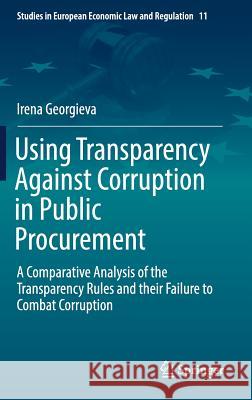Using Transparency Against Corruption in Public Procurement: A Comparative Analysis of the Transparency Rules and Their Failure to Combat Corruption » książka
Using Transparency Against Corruption in Public Procurement: A Comparative Analysis of the Transparency Rules and Their Failure to Combat Corruption
ISBN-13: 9783319513034 / Angielski / Twarda / 2017 / 269 str.
Using Transparency Against Corruption in Public Procurement: A Comparative Analysis of the Transparency Rules and Their Failure to Combat Corruption
ISBN-13: 9783319513034 / Angielski / Twarda / 2017 / 269 str.
(netto: 614,84 VAT: 5%)
Najniższa cena z 30 dni: 616,85
ok. 22 dni roboczych
Dostawa w 2026 r.
Darmowa dostawa!
This book examines corruption in public procurement in three Member States of the EU, reviewing their different approaches to combating corruption, and the extent to which the transparency principle is applied in their procurement systems. The focus of the work is on the contrast between the unsuccessful procurement legislation of a relatively young Member State (Bulgaria) and its attempt to curb corruption by expanding the scope of application of the transparency principle, and two examples of procurement systems where corruption is limited adequately, without an excess of information procedural requirements (Germany and Austria). The book scrutinizes the transparency rules, procurement participants, and responsible institutions in the award of procurements in these countries. It discusses in detail the types of infringements involving corruption as well as their link to infringements of the transparency principle. It compares and examines the systems of control and appeal against a contracting authority's actions within the various legislative schemes, and highlights the legislative weaknesses which fail to reduce corruption. The comparative analysis between the Bulgarian public procurement system and the German and Austrian systems is carried out through detailed research not only with regard to adherence to the transparency principle, but also to the use of other mechanisms to limit corruption, insofar as these solutions are appropriate and could be adapted in other countries currently lacking sufficient anti-corruption measures.











